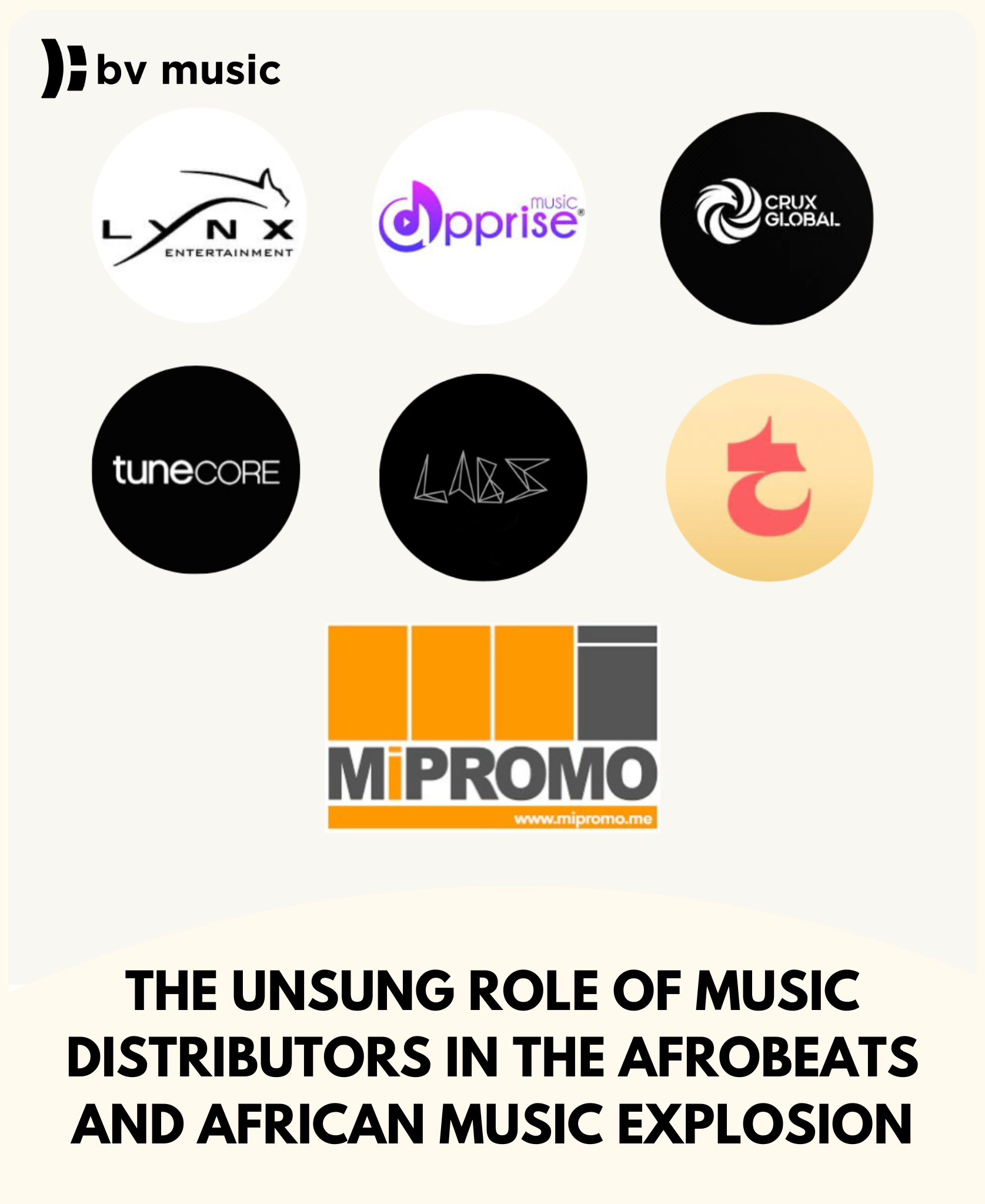The Unsung Role of Music Publishers and Distributors in the Afrobeat and African Music Explosion.

BV MUSIC
May 29, 2025
In recent years, Afrobeat and African music have carved a dominant place on the global music stage, with names like Burna Boy, Tems, Rema, Asake, and Amaarae echoing from Lagos to London, Accra to Atlanta. Yet, behind the hits that fill our playlists and clubs, there’s a powerful ecosystem quietly fueling the rise of these sounds, music publishers and distributors. Though they may not bask in the spotlight, music publishers and distributors are the backbone of the African music scene. Their role goes beyond business; they are enablers, gatekeepers, and catalysts of growth and global success.
Music publishers are responsible for ensuring that songwriters and composers get paid for their work. In Africa, where informal structures once made royalty collection nearly impossible, the rise of publishers like Sony Music Publishing, Mad Solutions, and local outfits like Sheer Publishing (South Africa) and Mdundo (Kenya) have revolutionized how artists earn.
For Afrobeat and African artists, publishers play a critical role in: Rights Management: Ensuring artists are properly registered with copyright societies like GHAMRO (Ghana), SAMRO (South Africa), COSON (Nigeria), or international organizations like ASCAP and PRS. Royalty Collection: Publishers collect mechanical royalties from streams and sales, as well as performance royalties from radio play, live shows, and syncs (when songs are used in TV, film, or ads). Sync Opportunities: Placement of African music in global media—think Wizkid in a Netflix series or Black Sherif in an Apple commercial is often made possible through publishers pitching music to music supervisors. Co-writing & Collaboration Deals: Publishers also help facilitate international writing camps and collaborations that bring African artists into global creative rooms. The Role of Music Distributors in Afrobeat's Global Boom If publishers are the financial guardians, distributors are the highways on which African music travels. Digital distributors like Tunecore, DistroKid, Ditto Music, and CD Baby, alongside African powerhouses like EmPawa Distribution (Nigeria), Rain Labs (Ghana), Tieme Music (Ghana), Africori (South Africa), and ONErpm Africa, make it possible for a track produced in a bedroom in Kumasi or Kampala to reach global audiences on platforms like Spotify, Apple Music, Boomplay, and Audiomack.
Their key functions include: Digital Distribution: Uploading and managing artist content on global streaming platforms. Playlist Pitching: Ensuring Afrobeat songs land on editorial playlists—vital for discovery and virality. Analytics & Strategy: Providing streaming insights that guide artist decisions on marketing, touring, and even sound direction. Revenue Collection & Payouts: Ensuring artists are paid for every stream and download globally. Localized Support: African distributors understand the terrain—from mobile-based streaming in East Africa to the heavy DJ culture in West Africa—and can tailor strategies accordingly.
The global explosion of African music didn’t happen by chance. While the artists deserve their flowers, it’s crucial to recognize the publishers and distributors making the business of music more sustainable for African creators. Without publishers, many hitmakers would lose millions in unpaid royalties. Without distributors, viral TikTok tracks wouldn’t convert into career-changing revenue. Without both, African music's global moment might have remained just that—a moment, not a movement.
As Afrobeat and other African genres continue to break boundaries, the role of publishers and distributors will only become more essential. There's a growing need for education among emerging artists about their services, rights, and the importance of data. In the next decade, Africa’s music industry will rise not just because of its talent, but because of the people and platforms working behind the scenes to ensure that talent thrives. So the next time you vibe to a new banger from Nigeria, Ghana, South Africa, or Kenya remember, there’s a whole machine behind it, making sure the beat doesn't just drop, but echoes around the world.
